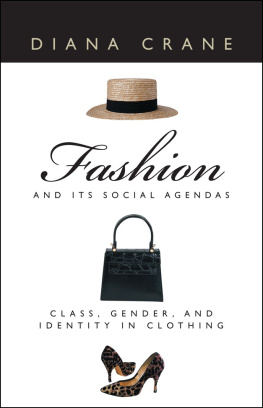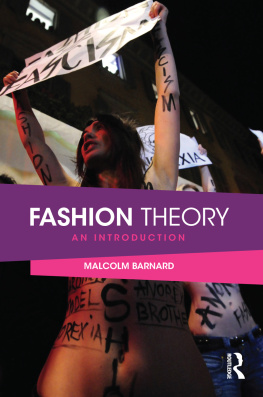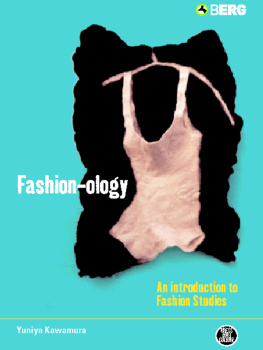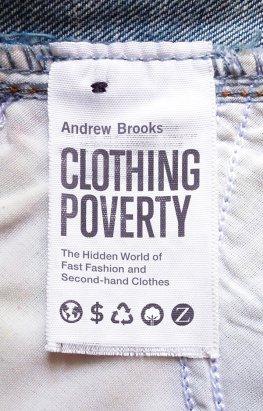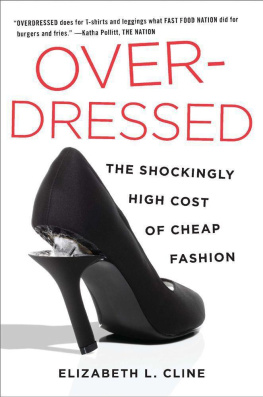THE FIGHT FOR ETHICAL FASHION
The Mobilization Series on Social Movements, Protest, and Culture
Series Editor
Professor Hank Johnston
San Diego State University, USA
Published in conjunction with Mobilization: An International Quarterly, the premier research journal in the field, this series disseminates high quality new research and scholarship in the fields of social movements, protest, and contentious politics. The series is interdisciplinary in focus and publishes monographs and collections of essays by new and established scholars.
Other titles in this series
Understanding the Tea Party Movement
Edited by Nella Van Dyke and David S. Meyer
Dynamics of Political Violence
A Process-Oriented Perspective on Radicalization and the
Escalation of Political Conflict
Edited by Lorenzo Bosi, Chares Demetriou and Stefan Malthaner
Beyond NGO-ization
The Development of Social Movements in Central and Eastern Europe
Edited by Kerstin Jacobsson and Steven Saxonberg
Violent Protest, Contentious Politics, and the Neoliberal State
Edited by Seraphim Seferiades and Hank Johnston
Student Activism and Curricular Change in Higher Education
Mikaila Mariel Lemonik Arthur
The Fight for Ethical Fashion
The Origins and Interactions of the Clean Clothes Campaign
PHILIP BALSIGER
European University Institute, Italy
ASHGATE
Philip Balsiger 2014
All rights reserved. No part of this publication may be reproduced, stored in a retrieval system or transmitted in any form or by any means, electronic, mechanical, photocopying, recording or otherwise without the prior permission of the publisher.
Philip Balsiger has asserted his right under the Copyright, Designs and Patents Act, 1988, to be identified as the author of this work.
Published by
Ashgate Publishing Limited
Wey Court East
Union Road
Farnham
Surrey, GU9 7PT
England
Ashgate Publishing Company
110 Cherry Street
Suite 3-1
Burlington, VT 05401-3818
USA
www.ashgate.com
British Library Cataloguing in Publication Data
A catalogue record for this book is available from the British Library
The Library of Congress has cataloged the printed edition as follows:
Balsiger, Philip.
The fight for ethical fashion : the origins and interactions of the clean clothes campaign / by Philip Balsiger.
pages cm
Includes bibliographical references and index.
ISBN 978-1-4094-5805-0 (hardback : alk. paper) ISBN 978-1-4094-5806-7 (ebook)ISBN 978-1-4724-0768-9 (epub) 1. Clothing trade--Moral and ethical aspectsEurope. 2. Anti-sweatshop movementEurope. 3. Consumer behavior--Europe. I. Title.
TT496.E85B35 2014
338.47687dc23
2014006819
ISBN 9781409458050 (hbk)
ISBN 9781409458067 (ebk-PDF)
ISBN 9781472407689 (ebk-ePUB)
To my parents
Contents
List of Figures, Tables and Documents
Figures
Documents
Tables
Preface
This book is the result of a long research journey and it would not be the same without the many people I encountered along the way. Its chapters were written and re-written in Lausanne, Zurich, State College, Pittsburgh, Cologne and Florence, and the fieldwork that it is based on was done in libraries, offices, cafes, shops and squares in Zurich, Paris, and a few other cities in Switzerland and France. It is impossible to mention everyone who has contributed, in one way or another, to this project, which goes back to the year 2006 when I first heard of a thing called political consumption and decided to study the collective actors behind it: how social movements mobilize consumers and target corporations.
My gratitude goes firstly to the activists working or volunteering for the Swiss and French Clean Clothes Campaigns (CCC) and some of the organizations contributing to it. Without their generosity, their willingness to share their stories and to respond to my questions, the research on which this book builds would not have been possible. My recognition especially goes to Nayla from the French Collectif Ethique sur ltiquette, who helped me greatly in getting in touch with former campaign officials in France and granted me access to the campaigns internal archives. I am also especially grateful to the people at the Zurich office of the Bern Declaration and the volunteers from one of its regional groups, who welcomed me to participate in their activities. Attending their meetings and contributing to their actions was very rewarding and it opened my eyes to many aspects of mobilization that I would have otherwise overlooked. I also want to thank all the other people who agreed to be interviewed for this studythose working for clothing firms, government programs, and organizations pursuing the goal of making fashion more ethical.
Intellectually, the book owes muchif not everything!to Olivier Fillieule, who is and has been a great mentor and friend, ever questioning existing theories of social movements and pushing me on the track towards a more interactionist and dynamic perspective on mobilization processes. The Centre de recherche sur laction politique of the University of Lausanne (CRAPUL) was an immensely inspiring place to develop this research and exchange ideas with fellow political sociologists and friends. With her poignant remarks and suggestions, Nonna Mayer from the Centre dtudes europennes at Sciences Po Paris also played a not insignificant role in improving this manuscript over the years.
When I left the University of Lausanne, I enjoyed the great privilege of being welcomed into two of the most outstanding European institutions to do social research, where I was granted generous fellowships which enabled me to rethink the structure of this book and complete its writing. First, the Max-Planck Institute for the Study of Societies in Cologne, Germany, provided me with a postdoctoral fellowship; I am especially grateful to the Institutes co-director, Jens Beckert, who invited me to join the sociology of markets group and whose interest in the role social movements play in the rise of moral markets has opened up new perspectives in my work. I then had the pleasure of becoming a Max Weber Fellow for a year, joining the Max Weber Programme of the European University Institute (EUI) in Florence. The inspiring intellectual encounters on the hills overlooking Florence, and the new friends found at the EUI made this time productive and unforgettable. I was also warmly integrated into the vibrant community of social movement scholars at the EUI led by Donatella della Porta, to whom I am particularly indebted. Following this time at the EUI, I also want to thank the Swiss National Science Foundation for awarding me a postdoctoral mobility grant, allowing me to continue my stay at the EUI and finish the last revisions for this book. In this last stage, the comments and suggestions by Hank Johnston, editor of the Mobilization series, were extremely helpful in improving and tightening this manuscript. I also want to thank Susan Garvin for her very careful language editing, and Claire Jarvis from Ashgate for her efficient work.
Finally, I want to dedicate this book to the people who mean the most to me and whose presence has helped me through all the ups and downs such a long research endeavor inevitably gives rise to. To Danny, who makes me smile every day and has fed me through many difficult moments with his marvelous Tuscan meals. To my brother, who is always high on my list. And, most of all, to my parents who have instilled me with intellectual curiosity and have always been there for me, supportive of my choice of pursuing academic research. At last their patient yet persistent questions about the progress of this book get a final answer.
Next page


